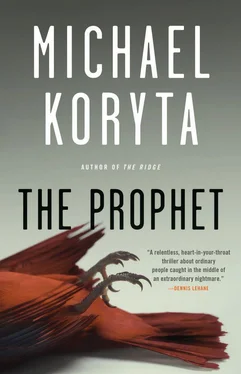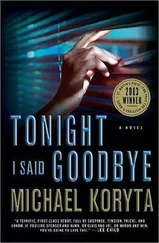“You tell me the truth, son. What helps you more—being here or being home?”
“Here, sir.”
“You know this doesn’t matter,” Kent said. He waved a hand at the field. “You understand that, don’t you?”
“It matters. I need it.”
Kent nodded. “I’ll be here, Colin. I can’t promise you anything that will help, but I can promise you I’ll be here. You have something you need to tell me, or want to tell me, do not hesitate.”
“Thank you, Coach.” He was crying now, and though Kent knew it he pretended otherwise.
“Whenever you feel like going,” he said, “you go.”
He stood up and began to walk away then. Colin Mears beat him back to midfield.
There were few things Kent imagined more unenviable than being a coach’s wife with two young children during the season. He tried hard to help, tried hard to ease the burden when he could, but the reality was that his evenings and nights were gone to the game for months at a time, and at this time, playoffs looming? The few hours became fewer.
It was past ten when he got home Tuesday, and that wasn’t anywhere near as late as many coaches would push it. Not as late as Kent was tempted to, either, but he’d built his program on regimented behavior, and that carried off the field and into the coach’s room. You did not waste minutes in Kent’s program, you did not waste even seconds. Focused attention, focused attention, focused attention. The kids heard it constantly, but what they did not realize was that the coaching staff heard it, too. Maybe more often. Other coaches could keep their staffs up into the wee hours watching game video with one eye, drinking beer and swapping jokes, but that would not happen at Chambers. Despite the even-keeled demeanor for which he was known, Kent had lost plenty of assistant coaches over the years because he wasn’t much fun. That was fine by him.
He came home, slipped into a dark house, kissed his sleeping son and daughter on the forehead, and went into the bedroom to have his wife tell him that Lisa had been hearing stories in school about her aunt.
“She asked me about Marie today,” Beth said. She was in bed with a Pat Conroy novel held against her chest and the TV on across the room. Something they bickered about with consistency and good nature. You can’t watch TV and read at the same time, Kent would say. It’s simply impossible. Pick one. Then she’d say, Funny, every now and then I’ll start doing other things with the TV still on and you never complain about that. And of course she had him there.
He sat on the bed beside her. “What did she say?”
“Some kids told her Marie was murdered. She wanted to know if it was true. Then she said that she’d heard it was in the newspaper. She wanted to read about it.”
Her voice was tired, and Kent laid a hand on her leg, sympathy and apology in the touch. It was an inevitable conversation that she’d had with their daughter, but it was also his to have, and she’d been forced to do it because he was gone. While he was demanding focused attention on videos of teenage boys playing a game, Beth had made dinner for two children and explained a homicide to one. There were times when his occupation felt almost foolish, when all of the We’re building character, we’re about more than the game, these kids are learning life lessons on the field felt absurd, and this was one of them.
“How’d she take it?” he asked, because he did not need to ask what Beth had told her. He knew there would have been neither coy games nor excessive detail, just gentle honesty.
“She wanted to know why you don’t talk about Marie. Why you never told her about it before. She seemed a little hurt by that.”
“Probably a fair response.”
“I told her that it hurts you to talk about it, and that a sister is a lot like a daughter and talking to her about it would probably hurt even worse because of that.”
He felt a thickening in his throat, looked away from her eyes and out to the dark window, bare limbs showing beyond the reflected light of the room. He let out a breath and swung himself onto the bed beside her, leaned his head against the pillow, and looked in her eyes. He could find peace in them, always had been able to, so many years of seeking things from within her now, so many years of having those things granted.
“I’m sorry,” he said.
“It might be best that I talked to her.”
“Did Andrew hear?”
“No.”
“Will she want to talk to me about it? Should I volunteer something?”
“You’ll need to talk to her. I don’t know if she’ll press it, but she’s curious. She was surprised she didn’t know. Thinks she’s far too old and mature to have it kept from her. I just said that it hurts you and that you’re very good at hiding the things that hurt you.”
When she said this, she reached out and squeezed his left knee, the bad one. He looked at her slender fingers working on the soft, damaged tissue below the kneecap.
“I’ll talk to her,” he said. “She thinks it’s unfair, and she’s probably right, and she deserves to understand her own family better than the kids at school do. I never wanted that.”
Beth said, “She’s also got another question I’ll let you field.”
“Yeah?”
“She wants to know if it has something to do with the reason we don’t like Uncle Adam.”
His gaze left her hand and returned to her eyes. “What?”
Beth nodded. “That’s exactly how she phrased it. We don’t like him. As if it’s something just understood. A family rule. We don’t like the Pittsburgh Steelers. We don’t like Uncle Adam. Casual.”
He passed a hand over his face, rubbed his forehead.
“All right,” he said. “I’ll talk with her.”
“Good,” Beth said. “What about Adam?”
“Huh?”
“Will you talk more with him?”
“No.”
“Really.”
“I said all I could say. You’re surprised? He and I don’t talk much, Beth.”
“I know that, Kent. I know that. All this, though?” She shook her head. “I just can’t believe one of you hasn’t picked up the phone.”
“To say what?”
“I have no idea. A girl’s murdered, you’re both talking to the police, you both knew her, and the whole town’s relating it to your sister. You’re right, Kent. Nothing to talk about.”
She released his knee, rolled over, and picked her book back up. He looked at her, frustrated, and said, “I’m trying to refocus and move forward, Beth. Trying to help my team do the same thing. Those are not Adam’s strengths. He circles, circles, circles. I can’t get caught up in that. I can’t.”
19
ADAM’S HOPE WAS THAT Rodney Bova did not live alone. That by evening someone else would join him in the house, someone who’d earned parole from Mansfield during the summer.
It wasn’t going to be that easy, though.
Bova was alone Tuesday night, and all day Wednesday and Thursday. He drove to work, parked in the hospital garage, logged his eight hours, then drove home and turned on the TV. At peace and oblivious.
And wasting Adam’s hours.
Adam was violating his own protocol. His motion had stopped, he was stagnant now, waiting for Bova to take action instead of taking it himself. He couldn’t afford to do that, but he also didn’t want to initiate direct contact. Not yet. Finding out who the man had been sending money to for all those months was critical, but Adam couldn’t risk flushing his quarry. He had to find other ways to pursue the information—go to the prison, interview Jason Bond, try to find and bribe a source within the commissary, something. To do all of those things, though, he would have to leave the man untended.
Читать дальше












